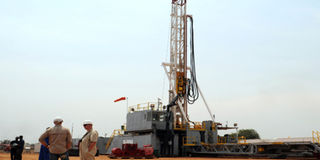Prime
Making sense of oil contracts

Some contracts in the oil sector have been ring-fenced for only Ugandans. PHOTO | FILE
What you need to know:
- Oil is a highly specialised sector. Therefore, it needs a lot of expertise and experience, much of which Ugandan companies do not have. Therefore, government has found it sufficient to create levels or categories, some of which have been ring-fenced for only Ugandan companies. In this article we shall seek to make sense of which contracts are available and exclusive to Ugandans.
A lot is going around. Of course, much of it concentrated on how, either at individual or company level, a company can participate in the oil and gas sector.
The oil and gas sector is now at development stage where investments worth $10b (Shs35 trillion) is expected to be injected in the economy to accelerate achievement of first oil in perhaps 2025.
Much of this money will follow a single flow – contracts - that have been broken down into three categories.
The idea behind the three categories is afford an opportunity where specialised services will be delivered at different levels.
At the top level, there are licensed oil companies - Total Energies and CNOOC - that will undertake the exploration and production work.
However, there are other specialized services that will also be required, which now brings us to categorized contracts.
Betty Namubiru, the Petroleum Authority of Uganda national content manager, says oil money will flow from licensed oil companies into other foreign and domestic companies through the award of tier one, tier two and tier three contracts.
Tier one contracts
Under this category, contracts are multi-billion dollar investments available to major industry players, who subcontract several other companies in tier two and three to provide goods and services.
Tier one contracts are highly specialised for companies dealing in oil and gas and are mainly available to international companies with proven experience spanning more than 20 years.
The tier requires high expertise, huge capital and work experience backed by substantial projects across different countries within the same industry.
Total Energies that will lead in production of oil in the Tilenga Area announced mid last year it had awarded five companies condition letters of award to tier one contractors in the engineering, procurement, supply, construction and commissioning sub sectors.
A contract worth $2b was awarded to a consortium comprising CB&I UK (a McDermott Company) and Sinopec International Petroleum Service Corporation for the engineering, procurement, supply, construction and commissioning of the central processing facility, flowlines, and other associated surface facilities.
The other companies contracted in tier one include, Schlumberger Oilfield Eastern for three oil well engineering packages, Vallourec Oil and Gas France for one oil well procurement package, ZPEB Uganda for one rigs package including, Onshore Drilling Rigs, Tubular Running and Fishing Services.
For now, there are fewer Ugandan companies awarded tier one contacts partly because the sector is still young yet most works require huge capital investment, and expertise.
Only two Ugandan companies, including ZPEG Uganda and Excel Construction, currently hold tier one contracts.
Excel Construction is viewed as the leader among Ugandan companies operating as a joint venture company between Madhvani Group, and Gomba Construction since 1992.
Excel Construction has been contracted by CNOOC for the Kingfisher project worth $23.2m (Shs83.5b) in Kikuube District to build well pads, access roads and water intake points.
According to the national supplier database, ZPEG Uganda is a registered as a Ugandan company, but has an offshoot and a local affiliate of Zhongyuan Petroleum Exploration, an active petroleum Chinese engineering service company operating worldwide.
Tier two contracts
These are mainly sub-contracted by tier one companies.
They are also highly specialized and technical contracts and require experience to execute.
However, they can leverage on joint ventures with foreign companies that have experience to deliver the job.
Depending on the service, the specialty of tier two contracts is not mainly tied on the oil and gas industry but require experience and technical capacity to deliver on services such as civil works, road construction, logistics, and campsite construction among other key technical services.
A lot of Ugandan companies have been subcontracted to provide goods and services at tier two contractors.
Most Ugandan companies are playing at this level because it is part of the national content regulations that seeks to include local companies in the services chain.
For instance, at tier two, McDermott, the main contractor in tier one subcontracted Mota Engil to do industrial site clearance for the Industrial Park.
Namubiru says it doesn’t entirely mean that tier two companies will be Ugandan. For Ugandan companies that are not able to fully undertake the services can opt for joint ventures.
“Foreign companies can only participate at tier two mainly through joint ventures,” Namubiru says.
The National Content Policy requires that goods and services required by the contractor or licensee are not available in Uganda, can provided by a company which has entered into a joint venture with a Ugandan company provided that the Ugandan company has a share equity of least 48 percent in the joint venture contract.
If the service you’re bidding for is a million US dollars, then the shareholding of a Ugandan company is at 48 percent,” she says.
Tier three contracts
Majority of tier three contracts are by definition expected to be executed by Ugandan companies with selection mainly based on finance and experience in the industry.
At three, the level of expertise reduces and there is less specialty tied on oil and gas.
In other words, most of the ring-fenced goods and services such as transportation, security, foods and beverages, accommodation and catering are tied into this category.
Others are human resource management, office supplies, fuel supply, land surveying, clearing and forwarding, crane hire, locally available construction materials, civil works, supply of locally available drilling and production materials, environment studies and impact assessment, communications and information technology services and waste management services.
“Tier three is largely ring-fenced for Ugandans. It is going to be rare to find a foreign company [there],” says Namubiru.
Ugandan companies involved in tier two and three
The level of involvement is quite extensive and varied but to pick a few, some of the Ugandan companies subcontracted in tier two and three include Pearl Engineering, Gauff Engineering, Civtec, Fabrication Systems, Pearl Engineering Company, GCC Services in Joint Venture with GCC Services Dubai, ICS, Newplan, MSL Logistics, Techlab – A geosciences company, MBW Consulting, Nina Interiors, Geotech Solutions, Bemuga Forwarders, Hoima Resort Hotel, Biiso FM Radio and SOL Engineering.
National supplier database
It is a requirement that prospecting companies are enlisted on the national supplier database, which was set up to vet enterprises that participate in provision of goods and services in the oil and gas sector.
The database so far, has 2,662 companies prequalified and registered by the Petroleum Authority, up from 513 in 2017.




